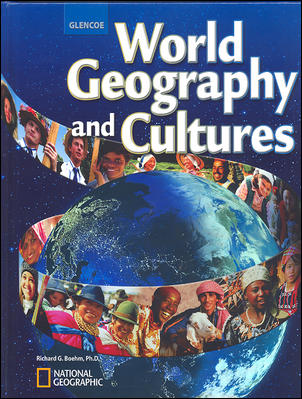
World Geography and Cultures © 2008Chapter 4: The Human WorldChapter OverviewsGeographers study how the earth's features influence human life and how humans affect the earth.World Population Global population is growing rapidly, placing more demands on food production, but the rate of population growth varies from place to place. Negative population growth creates a lack of workers, and some countries must recruit foreign workers or encourage immigration. Population distribution varies greatly from place to place, often as a result of migration from villages to cities for better economic opportunities or from country to country due to wars, food shortages, or lack of jobs. Global Cultures A society's culture is made up of many elements. Language is a strong unifying force. Religion provides a sense of identity but can also be a source of conflict. Governments and economic activities also help geographers divide the earth into culture regions. Cultures may change due to internal factors such as new ideas and inventions or because of spatial interaction such as trade, migration, or war. The first civilizations arose in culture hearths, which were farming settlements near rivers. Today, cultural diffusion has increased rapidly due to industrialization and the Information Revolution. World Religions There are seven major worldwide religions and many local, indigenous religions. Religions can be monotheistic, polytheistic, or mainly philosophical. Regardless of the type, religion often has an impact upon society and its culture. Political and Economic Systems The governments of the world's nearly 200 independent countries manage their individual territories, their populations, and their global relationships. Governments are organized in levels ranging from local to national. Power in a unitary government rests solely in the national government, while in a federal system power is divided between national and state or provincial governments. A single individual holds the power to govern in an autocracy, in an oligarchy a small group holds power, and in a democracy the leaders rule with the consent of citizens. Economic systems include a traditional economy, where habit and custom determine rules; a market economy based on free enterprise; and a command economy, where the government controls decisions. Mixed economies combine free enterprise with government support and regulations. Resources, Trade, and the Environment Different countries' economic activities depend on the resources available. While renewable resources can be used as needed, nonrenewable natural resources need to be conserved to meet future needs. Developed countries have manufacturing and service industries and high standards of living. Developing countries are shifting from agricultural to industrial economies. The uneven distribution of natural resources promotes world trade. Multinational companies stimulate trade, and governments work to reduce trade barriers. Economic activities have led to increased pollution of the air, land, and water, causing damage to ecosystems. |  |















